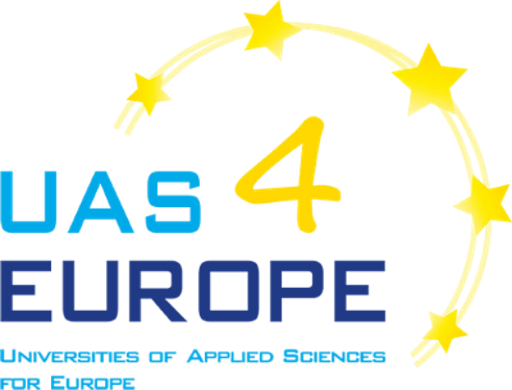Giving the European Universities of Applied Sciences a Voice!
Conference flyer
Conference programme and materials
Speakers’ bios
Evening reception programme
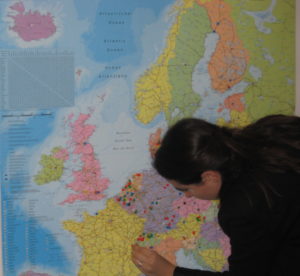 Universities of Applied Sciences (UAS) are well placed to participate in Horizon 2020 and FP9, but more can be done to improve its participation. This is one of the conclusions of the first ever UAS4EUROPE conference in Brussels. UAS4EUROPE, the network of universities of applied science in Europe, organised this conference and brought together more than 200 researchers, policymakers and rectors from 29 European countries. The conference consisted of a daytime event and a high level evening event.
Universities of Applied Sciences (UAS) are well placed to participate in Horizon 2020 and FP9, but more can be done to improve its participation. This is one of the conclusions of the first ever UAS4EUROPE conference in Brussels. UAS4EUROPE, the network of universities of applied science in Europe, organised this conference and brought together more than 200 researchers, policymakers and rectors from 29 European countries. The conference consisted of a daytime event and a high level evening event.
Daytime Event
The aims during the day were to learn, network and lobby, to discuss Horizon 2020, to understand how to prepare for a good proposal, and to find out what key ingredients are needed for a good participation of UAS in Horizon 2020 and beyond. The conference commenced with key notes delivered by Friedrich von Heusinger, Representation of the State of Hessen to the European Union and Stéphane Lauwick, President of EURASHE, who is the current rotating representative of UAS4EUROPE, who applauded the excellent position of universities of applied sciences to act as regional connector and as excellent partner to deliver applied research.
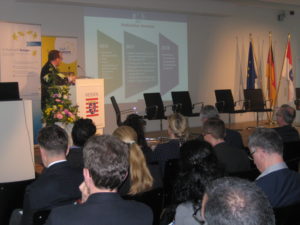 Brendan Hawdon of the Directorate-General for Research and Innovation, discussed with the audience the process leading up to FP9 and shared some first results from the consultation on the midterm evaluation of Horizon 2020. Stakeholders wish a continuity with Horizon 2020 (‘an evolution, not a revolution’), the societal challenge-based approach and support both research and innovation into one programme. Questions for the future are still open regarding the use of grants and loans, bigger and small consortia and the role of for example disruptive innovation and also defense research. After Hawdon’s presentation, Virginia Puzzolo of the Research Executive Agency (REA), provided practical tips about preparing a Horizon 2020. These tips included that applicants should be specific in their objectives and expected impacts as well as clearly demonstrate ow you aim to implement and sustain them.
Brendan Hawdon of the Directorate-General for Research and Innovation, discussed with the audience the process leading up to FP9 and shared some first results from the consultation on the midterm evaluation of Horizon 2020. Stakeholders wish a continuity with Horizon 2020 (‘an evolution, not a revolution’), the societal challenge-based approach and support both research and innovation into one programme. Questions for the future are still open regarding the use of grants and loans, bigger and small consortia and the role of for example disruptive innovation and also defense research. After Hawdon’s presentation, Virginia Puzzolo of the Research Executive Agency (REA), provided practical tips about preparing a Horizon 2020. These tips included that applicants should be specific in their objectives and expected impacts as well as clearly demonstrate ow you aim to implement and sustain them.
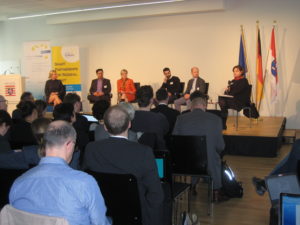 Before lunchtime a panel was convened with researchers, evaluators, representatives and coordinators from UAS and a SME. The panel discussed what needs to be done for UAS to participate well in UAS. There was broad agreement that Horizon 2020 is a suitable framework for UAS, but that mainly on the national and institutional level changes would have to be made. For instance, building up relevant networks, having good national support systems for information exchange and being able to read and understand calls properly were named amongst other challenges.
Before lunchtime a panel was convened with researchers, evaluators, representatives and coordinators from UAS and a SME. The panel discussed what needs to be done for UAS to participate well in UAS. There was broad agreement that Horizon 2020 is a suitable framework for UAS, but that mainly on the national and institutional level changes would have to be made. For instance, building up relevant networks, having good national support systems for information exchange and being able to read and understand calls properly were named amongst other challenges.
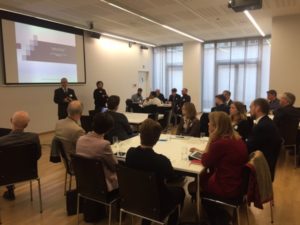 After lunch, parallel workshops were held with best practices on the themes Health and Wellbeing; Environment, Food and Agriculture; Living and Working in the 21st Century; Energy and Climate Change; Enabling and Industrial Technologies, Digitalisation; Arts and Design to deepen the discussions and facilitate the conference participants in their networking.
After lunch, parallel workshops were held with best practices on the themes Health and Wellbeing; Environment, Food and Agriculture; Living and Working in the 21st Century; Energy and Climate Change; Enabling and Industrial Technologies, Digitalisation; Arts and Design to deepen the discussions and facilitate the conference participants in their networking.
Evening Reception
Finally, the evening conference brought together a high level speaker panel.
UAS4EUROPE had the honour to welcome State Secretary Bernd Sibler of the Bavarian State Ministry of Education, Science and the Arts, who was so kind to host the network in its beautiful premises. In his welcome statement, he mentioned to be an active supporter of the UAS and believes it has a pivotal role to play in Horizon 2020. So did Keith Sequeira from the Cabinet of European Commissioner for Research, Science and Innovation Carlos Moedas. He very much welcomed the work UAS4EUROPE does and appreciated the contribution delivered to the European Innovation Council (EIC) and the statement on the mid-term evaluation of Horizon 2020.
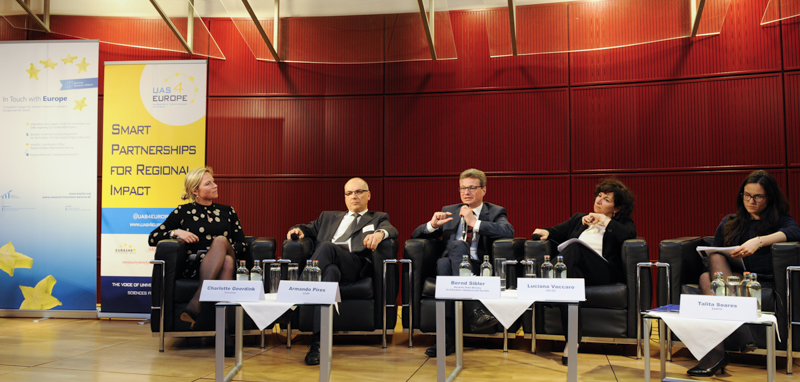
The evening was wrapped up with a panel discussion on forging Smart Partnerships For Regional Impact: how to work together with UAS in Horizon 2020 and beyond? For this panel, next to State Secretary Sibler, Luciana Vaccaro from the University of Applied Sciences Western Switzerland (HES-SO), Armando Pires from the Portuguese Polytechnics Coordinating Council and Talita Soares, from the European Association of research and Technology Organisations (EARTO) were invited. There’s a strong belief of ample opportunities for collaborating with UAS, in the importance of given their proper financial support and their role as connector in the region. The participants were sympathetic to the idea of the Smart Partnerships for Regional Impact (SPFRI), an idea which UASEUROPE will further elaborate the coming months. Soon UAS4EUROPE will also launch a survey on FP9 to gather inputs from the UAS.
UAS4EUROPE was grateful of the tremendous support for this event, kindly made possible by EURASHE, UASnet, swissuniversities, Hochschule Bayern e.V. (supported by the Bavarian Research Alliance) and the Austrian FHK.
